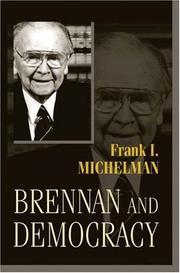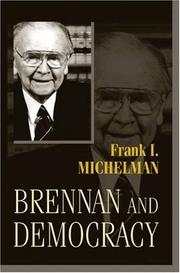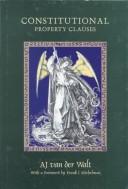| Listing 1 - 10 of 12 | << page >> |
Sort by
|

ISBN: 1400812690 1282753924 9786612753923 1400823366 9781400823369 140081717X 0691007152 0691122490 Year: 2005 Publisher: Princeton, NJ
Abstract | Keywords | Export | Availability | Bookmark
 Loading...
Loading...Choose an application
- Reference Manager
- EndNote
- RefWorks (Direct export to RefWorks)
In Brennan and Democracy, a leading thinker in U.S. constitutional law offers some powerful reflections on the idea of "constitutional democracy," a concept in which many have seen the makings of paradox. Here Frank Michelman explores the apparently conflicting commitments of a democratic governmental system where key aspects of such important social issues as affirmative action, campaign finance reform, and abortion rights are settled not by a legislative vote but by the decisions of unelected judges. Can we--or should we--embrace the values of democracy together with constitutionalism, judicial supervision, and the rule of law? To answer this question, Michelman calls into service the judicial career of Supreme Court Justice William Brennan, the country's model "activist" judge for the past forty years. Michelman draws on Brennan's record and writings to suggest how the Justice himself might have understood the judiciary's role in the simultaneous promotion of both democratic and constitutional government. The first chapter prompts us to reflect on how tough and delicate an act it is for the members of a society to attempt living together as a people devoted to self-government. The second chapter seeks to renew our appreciation for democratic liberal political ideals, and includes an extensive treatment of Brennan's judicial opinions, which places them in relation to opposing communitarian and libertarian positions. Michelman also draws on the views of two other prominent constitutional theorists, Robert Post and Ronald Dworkin, to build a provocative discussion of whether democracy is best conceived as a "procedural" or a "substantive" ideal.
Book
ISBN: 0197655866 019765584X 0197655858 Year: 2022 Publisher: New York, NY : Oxford University Press,
Abstract | Keywords | Export | Availability | Bookmark
 Loading...
Loading...Choose an application
- Reference Manager
- EndNote
- RefWorks (Direct export to RefWorks)
Frank I. Michelman explains why constitutional debates persist in modern day democracies. Through the lens of John Rawls' seminal work 'Political Liberalism', Michelman responds to the problems governments of constitutional-democratic societies face from deep-lying disagreement among citizens by presenting them with Rawls' solution: an accepted constitution.
Constitutional law --- Liberalism. --- Legitimacy of governments. --- Philosophy. --- Political aspects. --- Rawls, John, --- Governments, Legitimacy of --- Legitimacy (Constitutional law) --- Consensus (Social sciences) --- Revolutions --- Sovereignty --- State, The --- General will --- Political stability --- Regime change --- Liberal egalitarianism --- Liberty --- Political science --- Social sciences --- Constitutional limitations --- Constitutionalism --- Constitutions --- Limitations, Constitutional --- Public law --- Administrative law --- Interpretation and construction --- Roljŭ, J., --- Rōruzu, Jon,

ISBN: 9781400823369 9780691122496 Year: 2005 Publisher: Princeton, N.J. Princeton University Press
Abstract | Keywords | Export | Availability | Bookmark
 Loading...
Loading...Choose an application
- Reference Manager
- EndNote
- RefWorks (Direct export to RefWorks)
Book
ISBN: 0191945250 0192667211 019266722X Year: 2021 Publisher: Oxford, England : Oxford University Press,
Abstract | Keywords | Export | Availability | Bookmark
 Loading...
Loading...Choose an application
- Reference Manager
- EndNote
- RefWorks (Direct export to RefWorks)
"Legitimation by constitution" is a phrase coined by Michelman and Ferrara to represent an idea in Rawlsian political liberalism of reliance on a dualist democracy: ground-level laws are subject to the constraints of a legal constitution that all citizens, across the political spectrum, can accept as a framework for their collective politics.
Constitutional law. --- Constitutional law --- Constitutional limitations --- Constitutionalism --- Constitutions --- Limitations, Constitutional --- Public law --- Administrative law --- Interpretation and construction
Book
ISBN: 9780192855121 Year: 2021 Publisher: Oxford Oxford University Press
Abstract | Keywords | Export | Availability | Bookmark
 Loading...
Loading...Choose an application
- Reference Manager
- EndNote
- RefWorks (Direct export to RefWorks)

ISBN: 9041112731 Year: 1999 Publisher: Dordrecht : Kluwer,
Abstract | Keywords | Export | Availability | Bookmark
 Loading...
Loading...Choose an application
- Reference Manager
- EndNote
- RefWorks (Direct export to RefWorks)
Book
ISBN: 1919980261 Year: 2004 Publisher: AFRICAN SUN MeDIA
Abstract | Keywords | Export | Availability | Bookmark
 Loading...
Loading...Choose an application
- Reference Manager
- EndNote
- RefWorks (Direct export to RefWorks)
Constitutional law --- Civil rights --- Human rights --- Democracy --- Michelman, Frank I., --- Michelman, Frank Isaac,
Digital

ISBN: 9780814769119 9780814794487 Year: 2008 Publisher: New York, N.Y. New York University Press
Abstract | Keywords | Export | Availability | Bookmark
 Loading...
Loading...Choose an application
- Reference Manager
- EndNote
- RefWorks (Direct export to RefWorks)


ISBN: 9781400826889 9780691116488 Year: 2009 Publisher: Princeton, N.J. Princeton University Press
Abstract | Keywords | Export | Availability | Bookmark
 Loading...
Loading...Choose an application
- Reference Manager
- EndNote
- RefWorks (Direct export to RefWorks)
Multi

ISBN: 9781442678859 Year: 2016 Publisher: Toronto, Ont. University of Toronto Press
Abstract | Keywords | Export | Availability | Bookmark
 Loading...
Loading...Choose an application
- Reference Manager
- EndNote
- RefWorks (Direct export to RefWorks)
| Listing 1 - 10 of 12 | << page >> |
Sort by
|

 Search
Search Feedback
Feedback About UniCat
About UniCat  Help
Help News
News